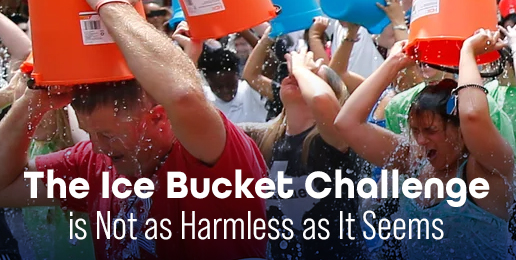
My social media feed has recently been flooded with friends and celebrities participating in the ice bucket challenge.
As the trend was taken on by those in my close friend circles, like any sane person, I began to pray nobody would pick me to endure such frigid torture.
Since I forgot to knock on wood, somebody nominated me.
Desperate for an out, I decided to look over the purpose of this trend (other than caving to peer pressure), and what I discovered was very interesting. . .
The ice bucket trend was initially started in 2014 by three men who had ALS, a motor neuron disease that impairs your bodily autonomy. The goal of the challenge was to raise awareness about their condition and funds to help in finding a cure for it.
The campaign exploded and by the end of the summer, over 17 million people had participated, with $220 million raised for the ALS Foundation.
Fast forward to 2025, and the ice bucket challenge has returned with a new campaign. The student club MIND based out of the University of South Carolina kicked off the trend this April to raise awareness about mental health and fundraise for Active Minds, America’s largest nonprofit mental health advocacy group for youth and young adults.
According to their latest press release, over 2,000 donations have been made, garnering $40,000 for Active Minds in the first week of the challenge.
Now, I’m reading all this background after being nominated, and something isn’t sitting right with me.
What exactly about mental health would I be supporting through this challenge?
Turns out, nothing I want to advocate for.
Doing some digging on their website, I found that Active Minds believes the best way to stand for mental health is to (among other delightful subjects)
- ban conversion therapy,
- enforce DEI training,
- call America racist, and
- push “gender-affirming” care.
As a Christian, I believe the best possible answer for a mental or spiritual health condition is the restorative power of a personal relationship with Jesus Christ–not blaming a nation or a system or pushing woke agendas.
So yeah, I’m not hopping on this trend.
This experience woke me up to the fact that it is vital to research even seemingly trivial trends before participating. If you call yourself Christian, then you are representing Him in everything you say, do, and post on social media.
Investigate before we influence.
A phenomenal example to follow is that of the disciples we all are (or should be) familiar with. The Berean church in Acts 17 did not ingest any message of their day without a hefty helping of figurative salt—even if the message was coming from the Apostle Paul himself.
They made sure to examine the Scriptures daily to see whether what they were hearing was true and thus earned the praise of “being more noble-minded” than other believers. In today’s world of ceaseless content, let’s be noble-minded.
Instead of taking trends or talking points at face value, let’s conduct our own research and see if they line up with Scripture.
2025’s ice bucket challenge does not.





















